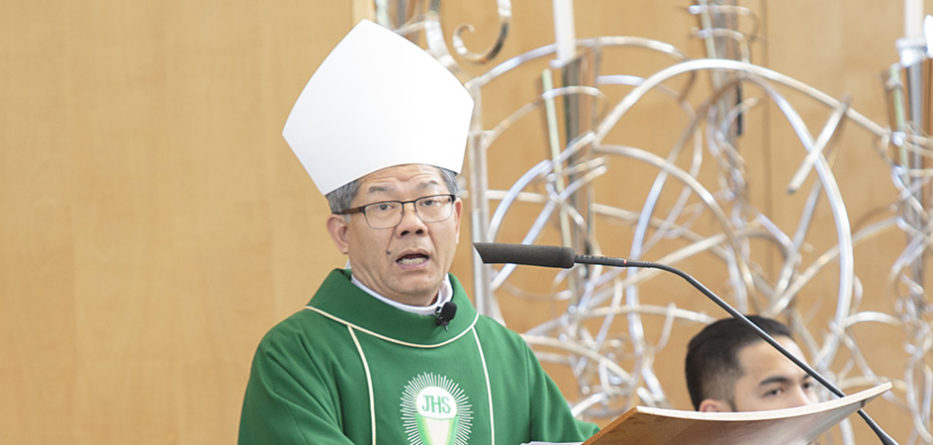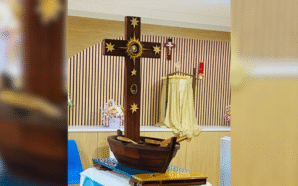Most Reverend Vincent Long Van Nguyen OFM Conv, Bishop of Parramatta
Readings: Is 56:1-7; Romans 11:13-32; Matthew 15:21-28
20 August 2023
Divine inclusion conquering human exclusions
Dear friends,
Walking home late on Friday night after a celebration with our Diocesan Diaconate Community, I saw a person lying on one of the benches in the park opposite the Cathedral. It was a bitterly cold and windy night, yet there he or she was with only some old blankets covering him or her against the elements. I couldn’t help but think about how fortunate I was and how -despite the label the lucky country- we still fall short of caring for people living on the margins of society. I couldn’t help but think about the Bishops’ Social Justice Statement I had launched earlier in the day. After 200 years of “modern” Australia, the gap is still not closing, and our indigenous brothers and sisters are still one of the most vulnerable groups. Until we have strengthened our relationship with the First Nations Peoples, the potential of the whole country will not have been realised.
The Word of God today reminds us that the Christian story is fundamentally about divine inclusion conquering human exclusions. It is about bringing people into the fullness of God’s shalom, rather than shutting them out in a zero-sum game. In Jesus, God calls us to bring outsiders into the circle of equal dignity, love and human flourishing. We are inspired by his word and example to enable strangers and outcasts to be stakeholders in new social possibilities. This is essentially the best of the Judeo-Christian heritage. It is the distinguishing mark of the early Jesus movement. It is the Church’s human enterprise.
In the first reading, the prophet Isaiah begins to expand the minds of his fellow Jews to move beyond their narrowly defined identity. It is not their bloodline or race but their fidelity to the covenant that constitutes them as God’s chosen. Hence, he reminds them: “Have a care for justice, act with integrity and the Lord’s salvation will come”. He then goes on to spell out in concrete terms what it means to care for justice and to act with integrity. It means to embrace foreigners and others who are considered outsiders. “My house, Isaiah proclaims, shall be called a house of prayer for all peoples.” This proclamation amounts to a seismic shift in their understanding of who God is and what it means to be his people. It expands the boundaries of God’s embrace to include people who were vilified as enemies and outsiders. A narrow definition of the chosen is replaced by a more inclusive vision. Perhaps, that was the greatest learning for God’s people in the time of trial. It was a silver lining in the dark cloud of the long exile.
In the Gospel, the message of Isaiah is further reinforced and enhanced by the example of Jesus. The story of the Canaanite woman is a powerful vehicle for the radical vision of what the kingdom of God is like. Against the acceptable convention, the message conveyed through the story is stunning and perhaps even dangerous in its openness to new possibilities. The Canaanite woman knew that, as a Gentile, in the eyes of the Jews she was a despised “dog.” She contrasts herself with the “children” of Israel. Nevertheless, she challenges the harsh exclusion against her on the basis of her race.
Jesus recognises the wisdom and strength of her faith and courage. He praises her “Woman, you have great faith. Let your wish be granted.” In doing so, he turns our sense of privilege and entitlement on its head. He shakes us out of our comfort zone. His example of allowing those considered unworthy and unacceptable into the purview of God’s love was immediately recognised for what it was, a dangerous articulation of an alternative social practice. It was dangerous because it led his listeners – who had uncritically accepted conventional rules of social engagement –to have second thought, to imagine that their own lives could be different.
Indeed, when we survey the many encounters of Jesus with the outsiders, we recognise a pattern of behaviour that subverts the status quo. It tells us that Jesus reveals a God who dignifies the oppressed, lifts up the downtrodden and empowers them to be the stakeholders of the new heaven and the new earth.
Paul understands the implications of God reconconciling all and reconfiguring a new reality in Christ. He writes in the second reading that the admission of the pagans into the household of God is nothing less than a resurrection from the dead. The pagans here can be understood not only in terms of non-Jewish people but also those considered outsiders by virtue of their class, status, nationality, gender or circumstances. Hence, elsewhere he writes “In Christ, there is neither Jew nor Greek, slave nor free, male nor female, for you are all one in Christ Jesus.”
In the light of the Scripture today, we pledge to create an environment where fear of differences is replaced by encouraging all people to share their gifts. The world often pushes us to compete or conform, but God calls us to a different way: working together, needing each other, being the body of Christ. We commit ourselves to walk as pilgrims open to be formed and enriched by the journey. May we in all the upheaval and chaos around us learn to act justly, love tenderly and walk humbly with the God who works with us towards a new heaven and earth.








